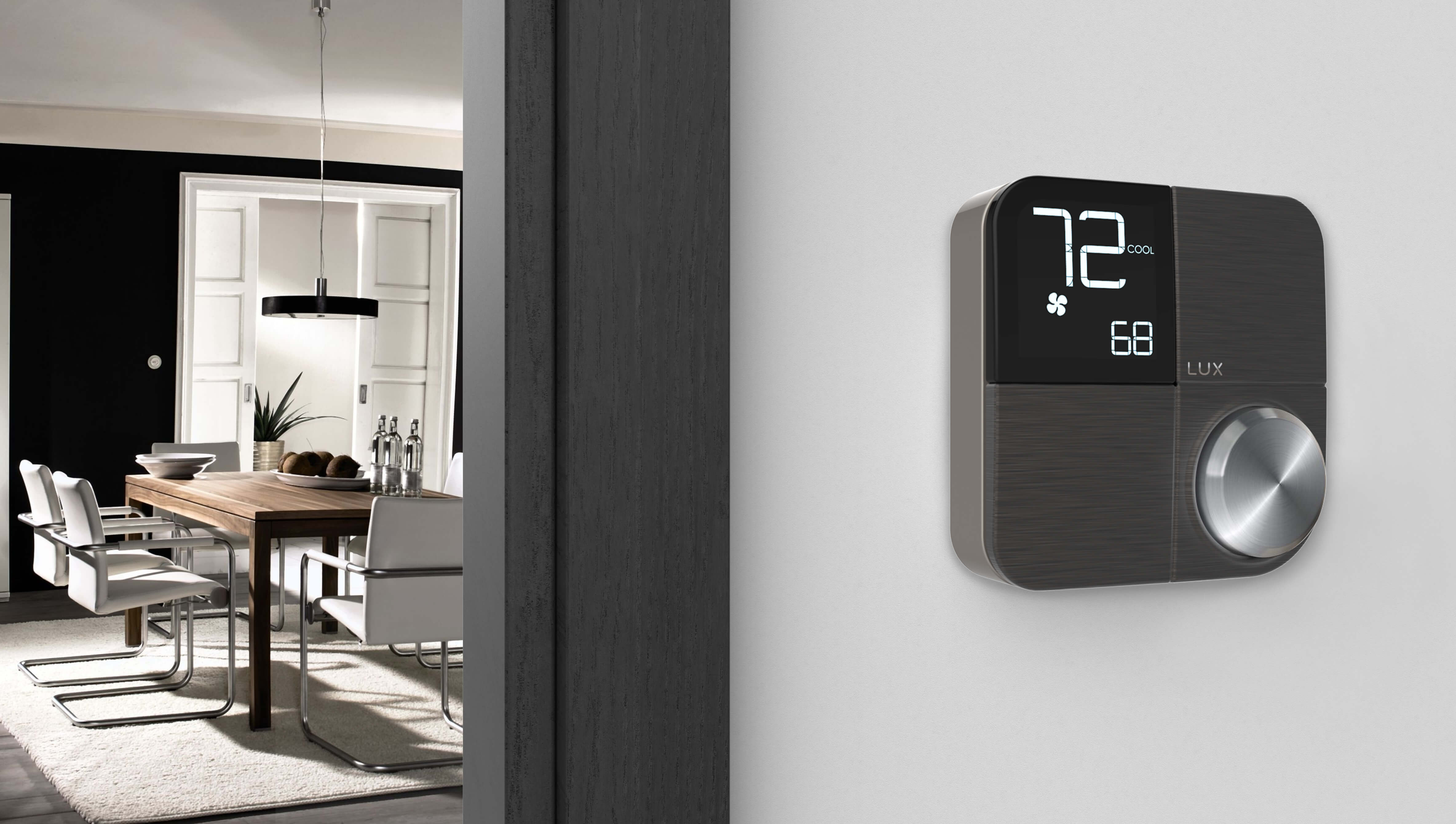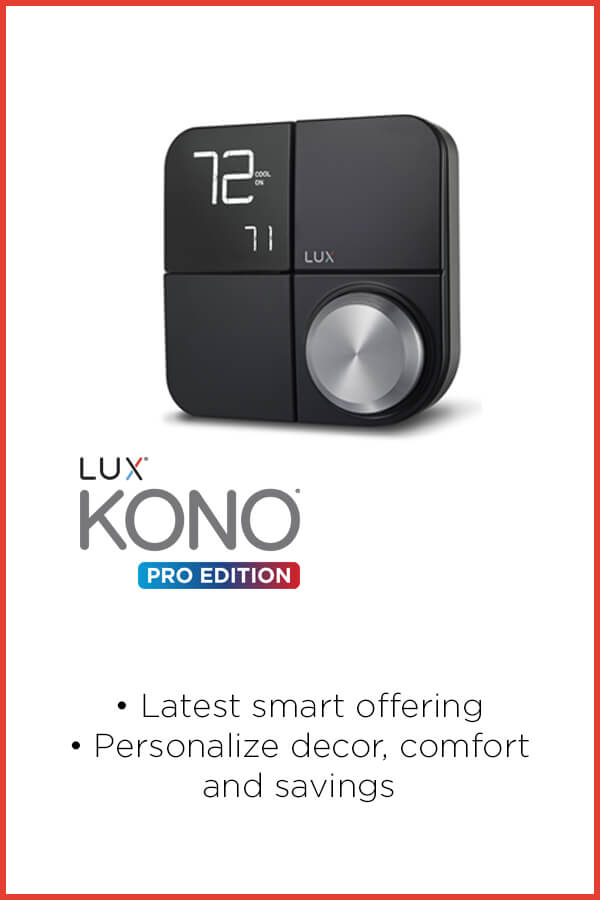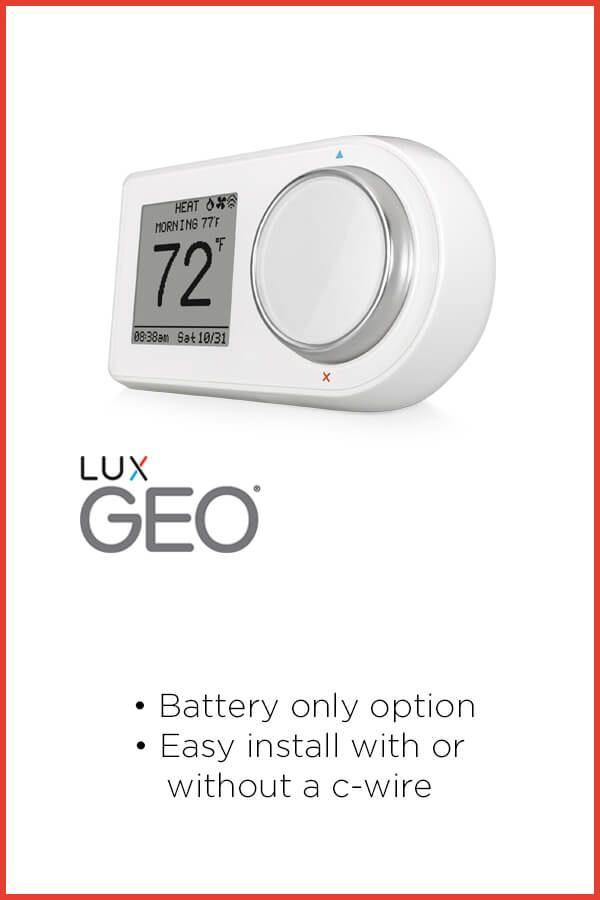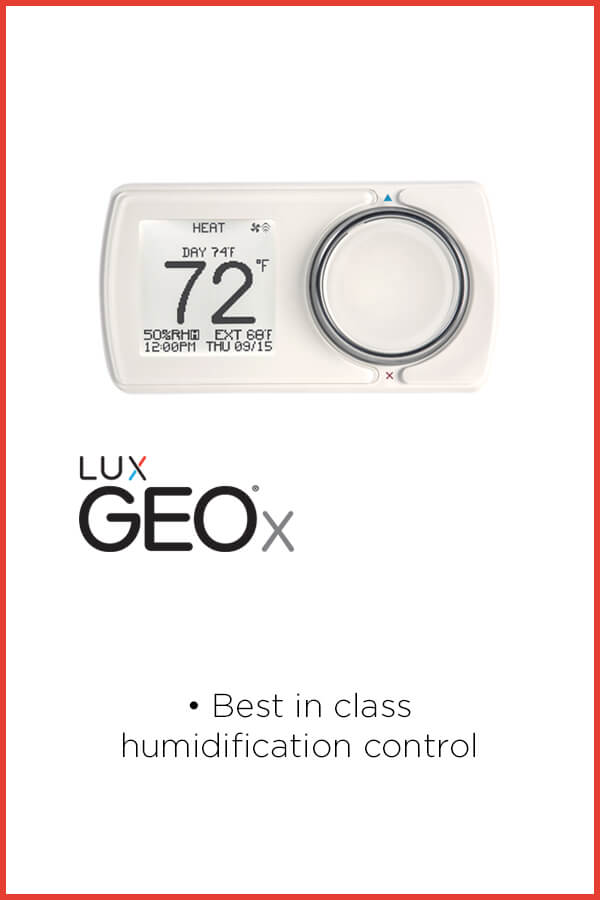
Benefits of a Smart WiFi Thermostat
The ability to take existing functionality but to do it better and make it more effective
Alerts
• Temperature: notifying home owners (regardless if they are home or away) of when their home has gone below the minimum temperature or above the max temperature. Prevent freezing pipes in the winter for a vacation home or making sure for elderly person that their home doesn’t become dangerously hot
• WiFi: Notifying homeowner if device is online or offline
• Filter Expiration: notify the home owner to replace their diminished filter and keep their HVAC airflow optimal
Scheduling
• The most meaningful mechanism to save on a home owners utility costs
• The experience of interacting with a thermostat schedule on an app is much more intuitive experience and our estimates are atleast 40% more people are utilizing a schedule with a WiFi LUX thermostat model as appose to non-WiFi Smart thermostats
• Smart features can really help homeowners make informed decisions: cost of increasing or decreasing set temperatures

Benefits of a Smart Home
The ability of connected devices to work together
• Scenes where lighting & heating and cooling can create an ambience
• Ceiling Fans and Heating/Cooling systems can work together to aid in comfort and utility costs
• Ability to automate Heating and Cooling system based on triggers from other smart home devices
• Ability to customize heating and cooling: remote sensors and occupancy sensors that determine where the occupants are located and what the temperature & humidity is in the location
• Ability to control heating and cooling from multiple interfaces: manual device control, voice, app, etc.
Smart Home Considerations
Compatibility
• Just as in HVAC where compatibility is paramount, it is also extremely important in Smart Home
• Smart Home Systems are comprised of Apple HomeKit, Google Home, Amazon Alexa
Smart Home Considerations
Compatibility
• Just as in HVAC where compatibility is paramount, it is also extremely important in Smart Home
• Smart Home Systems are comprised of Apple HomeKit, Google Home, Amazon Alexa
LUX App
• LUX puts smart technology in your hands with our easy to use, intuitive app. Click here to learn more.
If we look at where smart home adoption is today, we know that most homeowners are still learning the benefits of the smart home. We also know that one of the first products they purchase is a smart thermostat. While consumers are open to a “smart” approach, contractors need a plan to become the trusted source for the smart home and to understand how to approach each customer opportunity appropriately. Where do you – as a HVAC professional – fit in and how prepared are you to upsell smart technologies?
Approximately 16% of American households have at least one home automation device. This number grows each day as mainstream homeowners get more into the mix. In fact, according to Centre Code Research, 77% of homeowners who purchase a smart product are between the ages of 31 and 50.
Let’s look at the remaining 84% of homes that represent the biggest opportunity for HVAC professionals to get into the smart device arena. When asked why homeowners make a smart home purchase, some of the top answers are convenience and energy efficiency. This hits the core of the HVAC industry. The timing is ripe for contractors to upsell smart innovations in the areas of home comfort, simple light switches and other plug-in devices.
Let’s look at the HVAC industry specifically. When it comes to smart technology and products, how would you answer these questions?
• Are you comfortable with smart product technology?
• Do you feel out of your comfort zone when homeowners ask about smart options?
• If you had the right product and partner would you feel differently?
• Are you ready to bring smart options to your homeowners?
• And, more importantly, are your customers ready for smart products?
Thermostats, for example, are one of the first entry points for homeowners in the world of smart. They help make the overall HVAC system more efficient and they reduce energy costs. The LUX/GEO is a nice first offering since it’s priced right at just $149 (MSRP) – much less than some of the higher-end options. This full-feature thermostat is easy to install and works with or without a “C” wire. It’s also easy to use, making it a breeze when getting the homeowner up to speed (it works with or without WiFi). And, as thermostats have evolved and gotten smarter, they are tapping into other HVAC areas such IAQ. This creates additional opportunities for HVAC professionals to engage and expand projects with homeowners.
Residential home builders often look to have systems in place to differentiate their communities. Investing in smart technology is one way to do that. Multifamily communities are usually oversighted by property management. Smart technologies give them more control and access to properties. Aging in place is also creating opportunities where devices are needed to monitor and control happenings inside the home, while the homeowner or caregiver is remote. Smart technology allows for this access.
If the HVAC industry doesn’t seize these opportunities, then who will? According to Parks Associates, only 10% of homeowners go to an HVAC contractor to purchase a connected thermostat. That means 90% of homeowners are going elsewhere. 31% go to their national or local retailer, but HVAC professionals are also losing ground to broadband service providers, security dealers and utility providers. We need to keep customers in our sandbox and others out. This is why having a plan in place that arms you and your staff with product information and general smart knowledge is critical. LUX is dedicated to providing contractors the tools and support needed to be successful while on the job. From our live US-based technical support team to our online web chats and videos, contractors have the opportunity to educate themselves and homeowners every place along the way. And, our downloadable product manuals make it easy to offer leave-behinds when the project is over.
LUX technicians working out of our Philadelphia, PA headquarters are level 1 & 2 certified and the on-staff technical supervisors are available to troubleshoot the exceptions. Our team of developers is supported by future-thinking product engineers whose task is to watch current trends in HVAC as well as smart products and home automation to ensure the latest customer demands and emerging technologies are captured and delivered in our current and future products. Let us help you emerge as the local leader in smart HVAC solutions.
There is so much going on in the industry right now with new products targeting the smart home that sometimes it can get overwhelming and a bit confusing as to what products make sense for the homeowner and how “smart” homeowners really want their home to be. Thermostats are one of the first smart products to be added to the home. LUX CEO Rob Munin gives his take on what’s happening in the industry and the landscape of smart thermostats today.
Smart home product sales are growing. What are you hearing from homeowners about their desire to purchase smart products?
LUX recently conducted a survey asking consumers their feedback on smart products. When asked about their interest in purchasing smart products the number of people interested in smart home products we were pleased to see the speed of adoption. Over 60% of respondents said they were interested in purchasing a smart product for their home. Other industry data shows that actual smart home products penetration is less than 20%. So that tells us that there is broad desire but limited participation.
We also confirmed that this is no longer a higher income desire. Of the people with incomes less than $75K per year, more than 40% of them were interested in smart home products
Smart thermostats are a top smart home buy. What are the top three aspects of the thermostats that consumers are most drawn to?
There are always going to be consumers willing to spend at the high-end of the spectrum – either to be the first to have something or to be on-trend. LUX is a brand that focuses on mass market appeal with the best features and design at the best price.
Our research found that purchasers are most interested in simple, intuitive user interfaces and product designs. Our new KONO Smart beat other leading smart thermostats 2 to 1 in purchase interest and when asked about the design of KONO Smart compared to other leading thermostats, KONO won with over 50% of respondents choosing KONO based solely on its design.
How about price? Is there a certain price point for consumers or is money not as much of a concern?
Price point is a priority for homeowners. 70% of the people surveyed want a smart thermostat that is in the $100‐$149 range. This price range is the sweet spot for LUX – we offer the LUX/GEO and the KONO Smart.
Do most homeowners already know what smart products exist or is it incumbent upon the contractor to educate?
Yes, we have found that many consumers are aware of the growing smart home and smart thermostat product offerings. However, we have also found many HVAC professionals are playing catch-up to the consumer in this category. The HVAC professional has a real opportunity by partnering with manufacturers and distributors to become experts. The average consumer does do their homework before buying, but with a DIY product like a thermostat, most homeowners look to a professional for installation and confirmation of their selection. HVAC professionals need to embrace the opportunity.
Do you have any advice to share with contractors?
Yes, if you aren’t already comfortable talking about smart thermostats, it’s time to reach out to a trusted manufacturer or your local wholesale distributor. LUX, as with other manufacturers, have online video content to help get you started. The LUX technical services team even conducts NATE approved training on Smart Homes. Pros can call LUX or contact us on our support page and our team will guide you through the process. Contractors stay relevant when they stay current!
In addition to the support that we offer, LUX leads in innovation to provide contractors with meaningful solutions. Our Home Comfort app give contractors their own custom-branded WiFi app paired with the full-featured GEO thermostat. In addition, LUX provides a simple method to enter in the contractor information into the app to further enhance the contractor to home owner relationship.
When smart homes were first introduced they were reserved for the custom, exclusive residential community. Today, home automation and smart products have become much more mainstream. As an HVAC contractor, how do you sell smart into the home?
The biggest point to consider is your customer.
There are various stages in smart home adoption. Most homeowners look at home automation differently. 75% of home automation and smart sales relate to the ingress and egress of the home. What does a product do when I enter the home and what does it do when I exit? This is good news for HVAC contractors because many of its core products evolve around this issue, making it easier to sell “smart” from the start.
How do you know if your customer is ready to “get smart”? We need to look at the customer profile.
For example, a 50 to 60 year-old homeowner might be a little nervous about technology. They may not be well-versed in mobile devices and therefore aren’t used to navigating a mobile application from their phone or smart device. They are also likely to be in an older home which may not be conducive immediately for smart products. However, they do want peace of mind for emergencies and they want to make sure that they are connected in case something goes wrong. The connectedness of smart products to fire and police and also the access of extended family members being able to monitor their home may be a bonus for them and a reason to convert to smart.
If your homeowner is an early adopter, them her/she may consider themselves a Steve Jobs protégé. This is generally someone who can’t live without technology for more than five minutes and his/her mobile device is always on hand, whether it be a phone or a tablet. This type of homeowner is always looking for ways to bring technology into their life. With the quick adoption of home automation platforms like Amazon Alexa, this homeowner is right for a smart home environment.
Finally, if your customer is someone who is just starting a family then they be may be a little nervous about technology but they’re also very used to using it in there every day lifestyle. Their smart phone or device is generally close by and they use it for multiple purposes. This type of homeowner is also generally in a newer home or has purchased their parents’ home which has been renovated. They have a strong desire to keep the family safe. This type of homeowner hits the sweet spot for home automation and a smart thermostat is a first great entry point for them.
Now that you’ve established good, solid reasons for your homeowner to engage in the smart home, you are ready to upsell smart products within your portfolio. A smart thermostat is a great first smart product for any homeowner.
Of all the energy that a home consumes, HVAC equipment energy costs are almost 50% of it. This opens the door and creates a great opportunity for the HVAC professional especially when it comes to smart products.
But with all their smartness, these devices still need a human to install them and to keep them maintained. When it comes to the world of smart, it’s often critical for HVAC contractors to draw a line in the sand as to where the HVAC service begins and ends and where another professional needs to pick up.
The key to understanding the HVAC role in home automation and smart products is to understand that you don’t need to be everything to everyone. There will be times when the thermostat won’t work, but it won’t because there’s an issue in the HVAC system, it will be because an Internet connection is broken. At times like this, it is the responsibility of the HVAC contractor to alert the homeowner that they need to contact their Internet service provider for help.
One area where the HVAC professional can help, is to understand how the smart device, like a thermostat, works and to educate the home owner on how to use it or the app that supports it. This starts with the HVAC professional being educated on the products in their portfolio.
LUX has a highly-skilled team of technicians available to answer contractor questions. Technicians working out of our Philadelphia, PA headquarters are level 1 & 2 certified and the on-staff technical supervisors are available to troubleshoot the exceptions. Our team of developers is supported by future-thinking product engineers whose task is to watch current trends in HVAC as well as smart products and home automation to ensure the latest customer demands and emerging technologies are captured and delivered in our current and future products. Our investment in product development stems from our understanding and insight into the HVAC market.
As you go out into the field, know that it’s OK to set bounds as to what you can and can’t do. This is not a one size fits all job – and HVAC contractors need to feel supported in their field.



